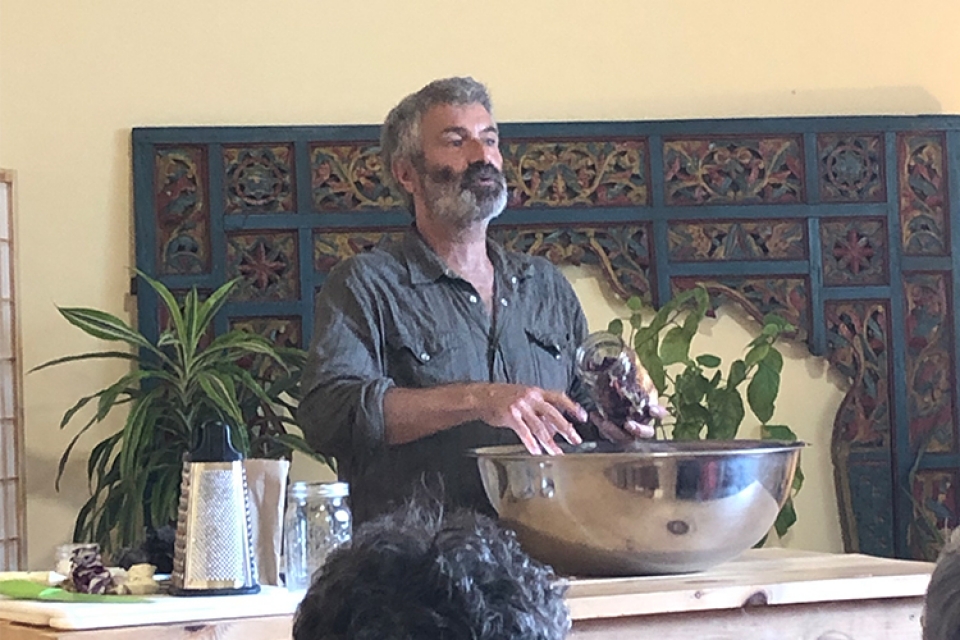Fermentation is Everywhere: An Afternoon with Sandor Katz
If you haven’t been to the Railyard Apothecary, you should definitely check it out! Living up to its name, the apothecary is nestled behind the old railroad tracks at the end of Battery Street and a stone’s throw away from the Burlington waterfront. The space sits right next to the Burlington Herb Clinic and has an herb shop. They also host educational classes, events and herb walks! Last month, Railyard hosted the “fermentation king”, Sandor Katz.
Katz began by giving a simple definition of fermentation. Fermentation is the transformative action produced through microorganisms. “Fermentation is everywhere” he said, and then referenced that about 1/3 of the food and drinks we consume are fermented in some way—think chocolate, cheese, meat, tempeh, miso, kombucha, beer, wine, the list could go on! After some background, Katz then dove into the practical uses of fermentation, in other words why we consume fermented foods. Here is how he broke it down:
Flavor
- Fermentation creates strong, compelling tastes in food products.
- It is an acquired taste and varies from product to product.
Preservation
- Originally fermentation was used as a food preservation technique-- it was depended on for survival.
- After the harvest season, everyone would start canning, pickling, and fermenting their food to put in storage. This would hopefully get them through the winter months until the next growing season.
Health Benefits-this is a big one!
- Fermentation acts as a pre-digestion and as a result makes minerals more bio-available. That is the reason why some people who have gluten-sensitivities are still able to enjoy sourdough bread! The gluten molecules are partially broken down in the fermentation process, making them more digestible.
- In some fermentation products there are elevated levels of B & K vitamins
- Unique micronutrients produced through fermentation process help to dissolve fiber
- Presence of organic acids as a metabolic byproduct
- Beneficial bacteria!
The list of health benefits is a long one and doesn’t stop at the list above. If you feel like exploring more, I’d encourage you to check out Katz’s book The Art of Fermentation.
Katz continued by distinguishing the different types of fermentation processes. Generally there are two types of fermentation, a wild or spontaneous fermentation and a starter culture fermentation. Everything in our world, including us, is populated by microorganisms, which includes all the food we consume. These microorganisms are the building blocks of fermentation and what create all the magic! In a wild fermentation there is no need to add bacteria, the process uses the already existing micro-bacteria on the product-- examples include sauerkraut and wine. On the other hand, I think of a starter culture as a fermentation booster. For example, to make kombucha you need a SCOBY (symbiotic culture of bacteria and yeast) or to make sourdough bread you need a sourdough starter. These starters help jump start the fermentation process by providing an environment where the microbes in the tea or flour can begin to digest the sugars and turn them into carbon dioxide, which ultimately helps to achieve the overall desired product.
Katz ended his talk by explaining the origin or the word fermentation. The root of the word, fervere is of Latin origin and means “to boil or bubble”. If you’ve ever looked at a jar of sauerkraut or beer you can actually see bubbles in the jar. This sort of cold boil action, is a result of the fermentation process. Sandor took it a step further to explain that fermentation, or this boiling, bubbling, extends beyond just our kitchens or cellars. We see the bubbling or ferment of social, cultural and spiritual movements developing everywhere. This metaphorical translation allows us to see how fermentation is not just about transforming our cabbage into sauerkraut or grapes into wine but can also be a vehicle for social change. You never thought your kimchi could be so inspiring, right?
Throughout the year, we host multiple fermentation classes from learning how to make kombucha to introduction to baking with sourdough. For more information about our upcoming classes and events or to sign up for our classes and events specific e-newsletter, click here!
